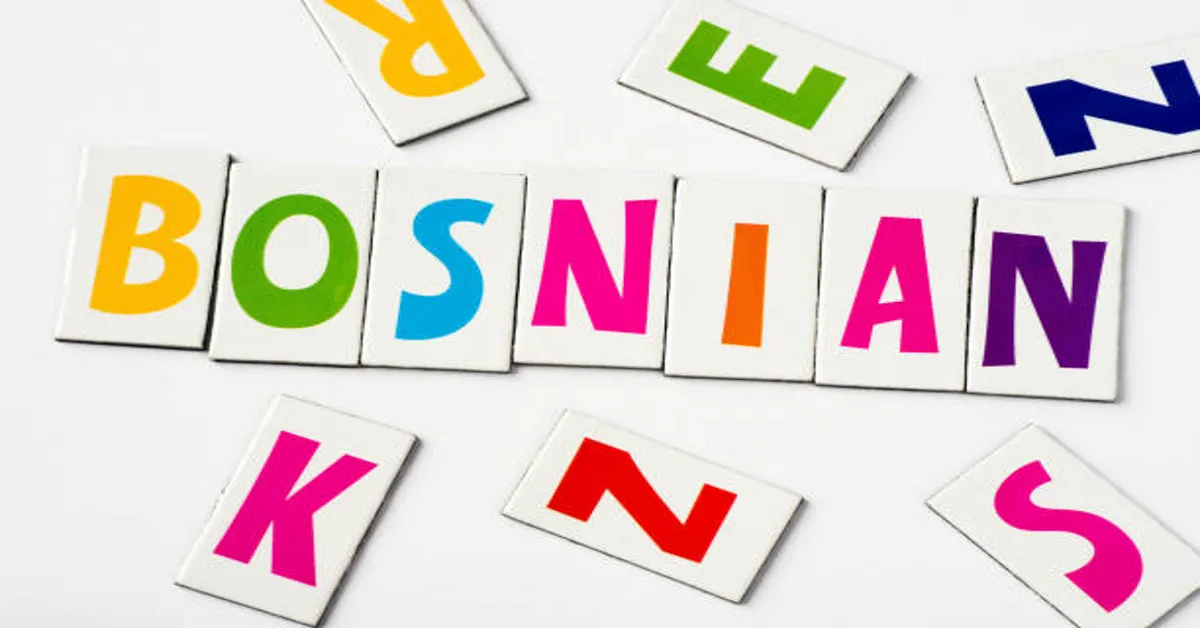When you search “Bosnian to English,” you’re looking for more than a word-for-word translation—you’re seeking understanding, accuracy, and often, cultural relevance. Whether you’re navigating a government form, reading a Bosnian novel, or communicating with friends or family, translating from Bosnian to English today involves more than just digital tools. It’s a linguistic journey that blends grammar, cultural nuance, and evolving AI technologies.
This guide provides updated and deeply researched information on Bosnian to English translation as of 2025—from beginner tips to professional workflows, practical tool recommendations, real-world examples, and the role of machine learning in modern translation.
Understanding the Bosnian Language
Bosnian is a South Slavic language primarily spoken in Bosnia and Herzegovina and among diaspora communities in Europe and the Americas. It shares much of its grammar and vocabulary with Serbian and Croatian, yet maintains distinct features shaped by cultural, religious, and historical contexts.
It uses both Latin and Cyrillic scripts, though Latin is predominant today. Many Bosnian phrases are deeply embedded in cultural idioms, making literal translation into English difficult without context.
Why Accurate Bosnian to English Translation Matters
Translation isn’t just about substituting words. It’s about:
- Preserving meaning: Words don’t always map directly.
- Avoiding misinterpretation: Especially in legal or medical contexts.
- Facilitating diplomacy and migration: Bosnian speakers often need translated documents to live or work abroad.
- Cultural respect: Good translation shows cultural awareness.
Whether it’s a visa application or a work contract, accuracy directly affects lives.
Core Differences Between Bosnian and English
These two languages diverge significantly in structure and expression:
- Word order: English follows a strict Subject-Verb-Object (SVO) pattern. Bosnian is more flexible.
- Cases: Bosnian uses seven grammatical cases, while English uses almost none.
- Gendered nouns: All Bosnian nouns are gendered (masculine, feminine, neuter).
- Verb conjugations: Highly inflected in Bosnian; English is simpler.
- T/V distinction: “Ti” (informal you) and “Vi” (formal you) complicate direct translation.
Understanding these helps avoid common translation errors.
Common Challenges in Translation
Idiomatic Expressions
Bosnian idioms often don’t make sense in English unless interpreted, not translated.
Example:
Bosnian: Pao s Marsa
Literal: “Fell from Mars”
English equivalent: “Out of touch with reality”
Lack of Context
One Bosnian word may have multiple meanings in English, depending on usage.
Cultural Sensitivity
Bosnian terms related to religion, ethnicity, or history carry weight. A neutral tone in English is often required.
Best Tools for Translating Bosnian to English in 2025
1. Google Translate (2025 Edition)
Better than past versions, it uses contextual AI and voice input.
2. DeepL Pro
Highly rated for sentence-level fluency.
3. iTranslate App
Useful for travelers and on-the-fly conversation.
4. Microsoft Translator
Works well in Office documents and Teams.
5. Custom Neural Models
Offered by enterprise services, trained on industry-specific data.
Human vs Machine Translation: What’s Better?
| Factor | Human Translator | Machine Translator |
|---|---|---|
| Accuracy | High | Moderate to High |
| Speed | Slower | Instant |
| Contextual Understanding | Excellent | Improving |
| Cost | Higher | Often free or low-cost |
| Nuance | Superior | Limited |
| Availability | Limited | 24/7 |
Verdict: For important documents, go human. For casual needs, machine translation suffices.
The Role of AI and Neural Networks
AI-based neural machine translation (NMT) systems now predict context, tone, and structure instead of just substituting words. In 2025, these systems:
- Detect dialects within Bosnian
- Recognize idioms and suggest equivalent English expressions
- Allow voice-to-text real-time translation with feedback
Still, AI lacks emotional intelligence and struggles with irony, sarcasm, or layered meanings.
Real-World Use Cases of Bosnian-English Translation
- Immigration Services: Visa applications, asylum interviews
- Business Contracts: Export agreements, NDAs
- Academic Exchanges: University transcripts, diplomas
- Tourism: Brochures, guidebooks, mobile apps
- Media: Film subtitles, interviews, cultural programming
Translation in Government, Law, and Immigration
Government documents require certified translation—accuracy, format, and seal from a licensed translator.
Examples include:
- Birth and marriage certificates
- Passports and ID translations
- Police reports
- Medical history documents
Failure to provide correct translation can delay or invalidate applications.
Cultural Context in Bosnian to English Translation
Understanding the cultural mindset is crucial.
- Politeness markers: What sounds polite in Bosnian may seem overly formal in English.
- Religious references: Bosnia’s multi-faith society (Muslim, Catholic, Orthodox) influences phrasing.
- Historical weight: Words like “četnik” or “ustaša” carry different connotations in English.
A good translator must filter these into culturally digestible language.
Table: Key Differences Between Bosnian and English Grammar
| Feature | Bosnian | English |
|---|---|---|
| Cases | 7 | Rarely used (mostly pronouns) |
| Verb Tenses | Complex, aspectual | Simplified, linear |
| Noun Gender | Masculine, Feminine, Neuter | No grammatical gender |
| Pluralization | Rules change by case/gender | Generally adds “-s” |
| Word Order | Flexible | SVO (mostly fixed) |
| Articles | None used | “A,” “an,” and “the” used |
How to Translate Legal and Official Documents
Steps:
- Get a certified translator familiar with Bosnian legal language.
- Include original formatting, seals, and page numbers.
- Ensure translator credentials and contact details appear on the final document.
- For U.S. or EU applications, provide notarization or affidavit of accuracy.
Academic and Technical Translation Guidelines
When translating academic material:
- Use consistent terminology (e.g., “učitelj” = teacher, but not “instructor” unless contextually valid).
- Convert units and measurements to local standards (metric to imperial).
- Translate footnotes and citations carefully to preserve intellectual property.
Translating Dialects and Regional Variations
Bosnian includes elements of:
- Sarajevski (urban Bosnian dialect)
- Krajina and Herzegovina regional variations
- Influences from Serbian and Croatian
Translators must normalize terms before converting to English to avoid confusion.
How to Choose a Professional Translator
Criteria:
- Native fluency in both Bosnian and English
- Sector-specific experience (legal, academic, medical)
- Certification from an official body (ATA, ITI, etc.)
- Proven track record (client references, sample projects)
Avoid using freelance platforms without vetting credentials.
Certification and Quality Standards
Look for:
- ISO 17100: Quality management for translation
- ATA Certified Translator (CT): U.S.-based gold standard
- Chartered Institute of Linguists: UK equivalent
Always ask for a signed statement of accuracy if required for legal use.
Free vs Paid Translation Services: A Cost Comparison
| Service Type | Average Cost (USD/Page) | Speed | Certification Included |
|---|---|---|---|
| Google Translate | Free | Instant | No |
| Freelance Translator | $10–$50 | 1–2 days | Sometimes |
| Certified Translator | $40–$100 | 1–3 days | Yes |
| Translation Agency | $60–$120 | 2–5 days | Yes |
Free services are useful for casual content but not suitable for legal or professional use.
How Bosnian to English Translation Helps Global Business
- Facilitates outsourcing and remote hiring in Bosnia
- Opens tourism content to English-speaking markets
- Allows multilingual marketing for Balkan businesses
- Enables legal compliance when expanding operations into the EU or U.S.
Translation in Literature and Media
Literary translation requires more than accuracy—it demands artistic sensibility. Key considerations:
- Preserving emotional tone and rhythm
- Translating metaphors appropriately
- Respecting historical context
Bosnian novels translated into English have gained international readership when handled by skilled literary translators.
Summary and Final Thoughts
Translating from Bosnian to English in 2025 is no longer a niche task—it’s a vital bridge across immigration, education, commerce, and culture. With improved machine tools and greater professional awareness, the process has never been more accessible.
Still, context remains king. Machines may translate fast, but humans ensure meaning, tone, and nuance survive the journey. Whether you’re translating a document, a conversation, or a story, invest in the right approach—because every word matters.
ALSO READ: Kettering MyChart: Navigating Digital Healthcare Access Easily
Frequently Asked Questions
Q1: Can I use Google Translate for official Bosnian documents?
A: No. Official documents require certified human translation for accuracy and legality.
Q2: What’s the difference between Bosnian and Serbian translation?
A: They are mutually intelligible but differ in vocabulary, script, and regional usage. Translation should reflect the correct source dialect.
Q3: Are there certified Bosnian-English translators available online?
A: Yes, many professionals and agencies offer online certified translation services.
Q4: Do I need both Latin and Cyrillic translations?
A: Typically no—Latin is standard for Bosnian. Cyrillic is more relevant in Serbian contexts.
Q5: What’s the best tool for quick Bosnian-English phrases?
A: DeepL or Google Translate (2025 edition) offers the best results for casual use.









